-The Grief Guide
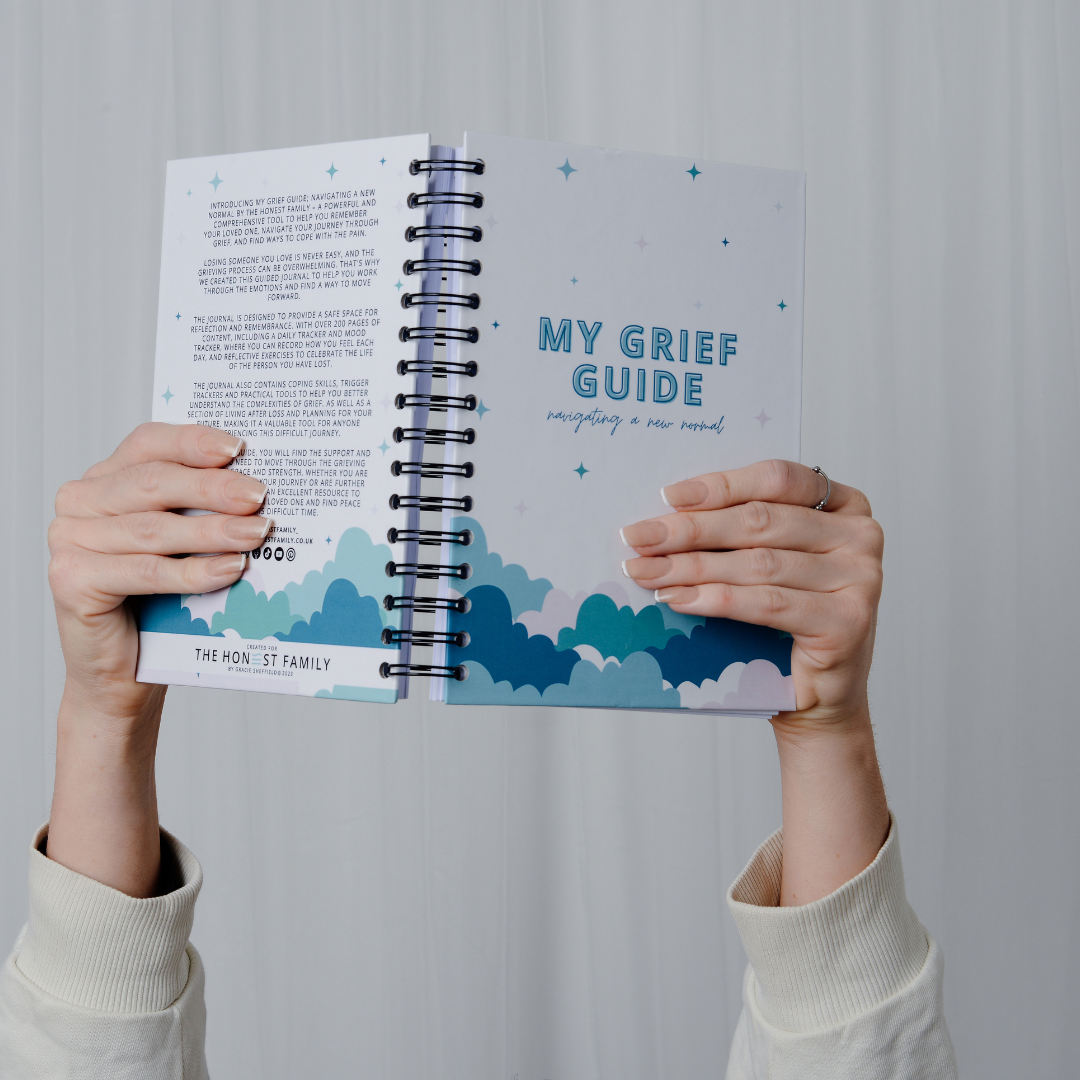
What is in the grief guide?
The grief guide has 6 topic areas.
About your loved one - A space for you to reflect on the person you've lost, favourite memories, difficult dates, things you wish you could say and a space to write letters
The grieving process - Covering the stages and symptoms of grief, how grief looks for you, growing around grief and analogies to help you visualise and process grief
Managing grief - Trigger and coping strategies, grounding techniques, self soothing ideas, coping strategies and trigger trackers
Tracking grief - 6 months worth of daily reflections (undated), a monthly and yearly mood tracker
Life after loss - A bucket list for your life, quarterly reflections, big occasion letters and help advice and support.
Will writing down my feelings help me feel better?
Brain scans on volunteers showed that putting feelings down on paper reduces activity in a part of the brain called the amygdala, which is responsible for controlling the intensity of our emotions.
Psychologists who discovered the "Bridget Jones effect" said it worked whether people elaborated on their feelings in a diary, penned lines of poetry, or even jotted down song lyrics to express their negative emotions.
-The Guardian
Will the grief guide go out of date?
There is no timeline on grief so there is no timeline on the grief guide.
The grief guide covers the stages of grief, which don't change. A space for you to write coping strategies and triggers and undated daily reflections for 6 months.
What are the stages of grief?
Although grief and loss are individual experiences and no two people will go through the same thing, grief itself is universal.
Grief isn't linear and there is no set way to experience it
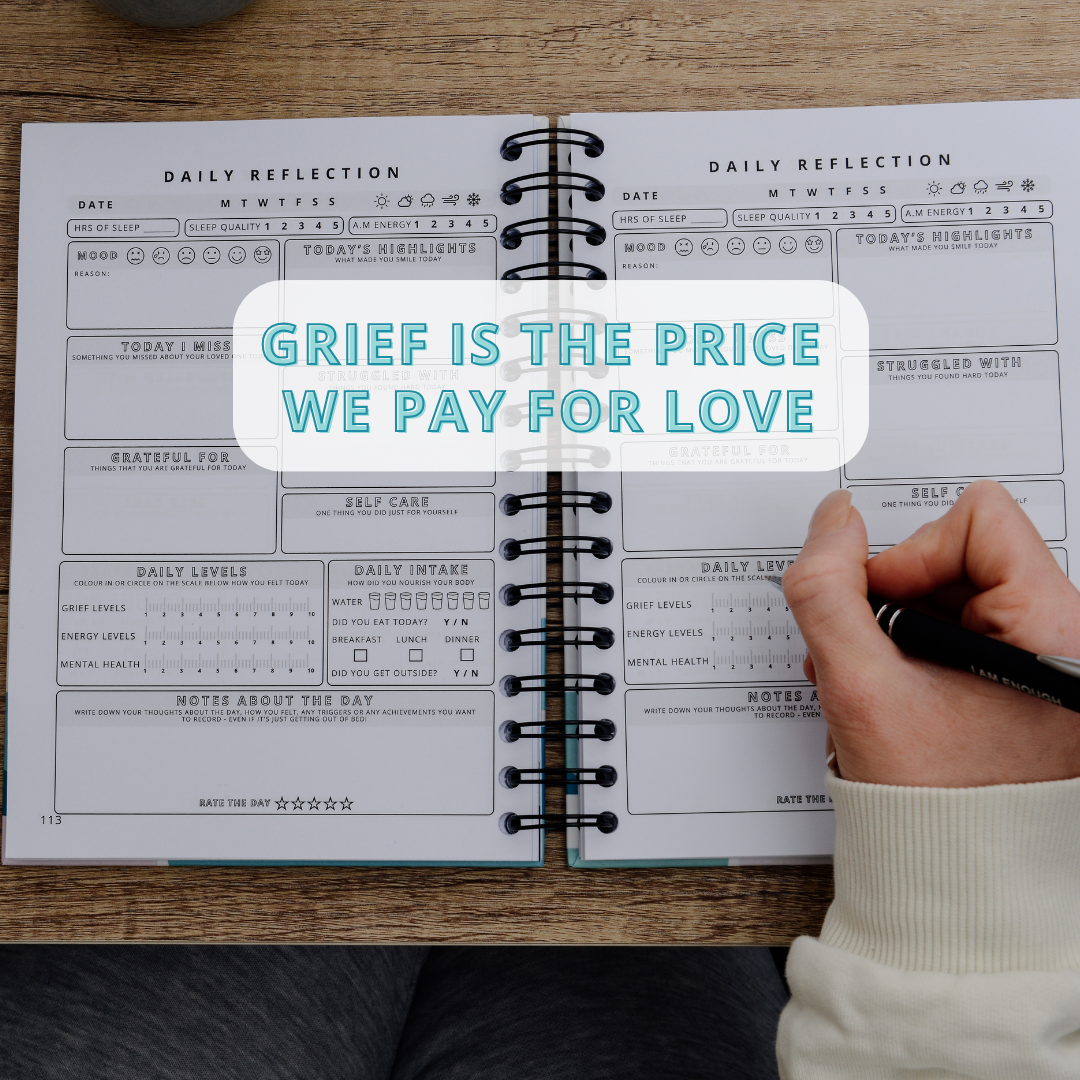
Grief Guide Journal: Navigating the New Normal After Loss by The Honest Family - A Compassionate Companion for Healing and Rediscovery
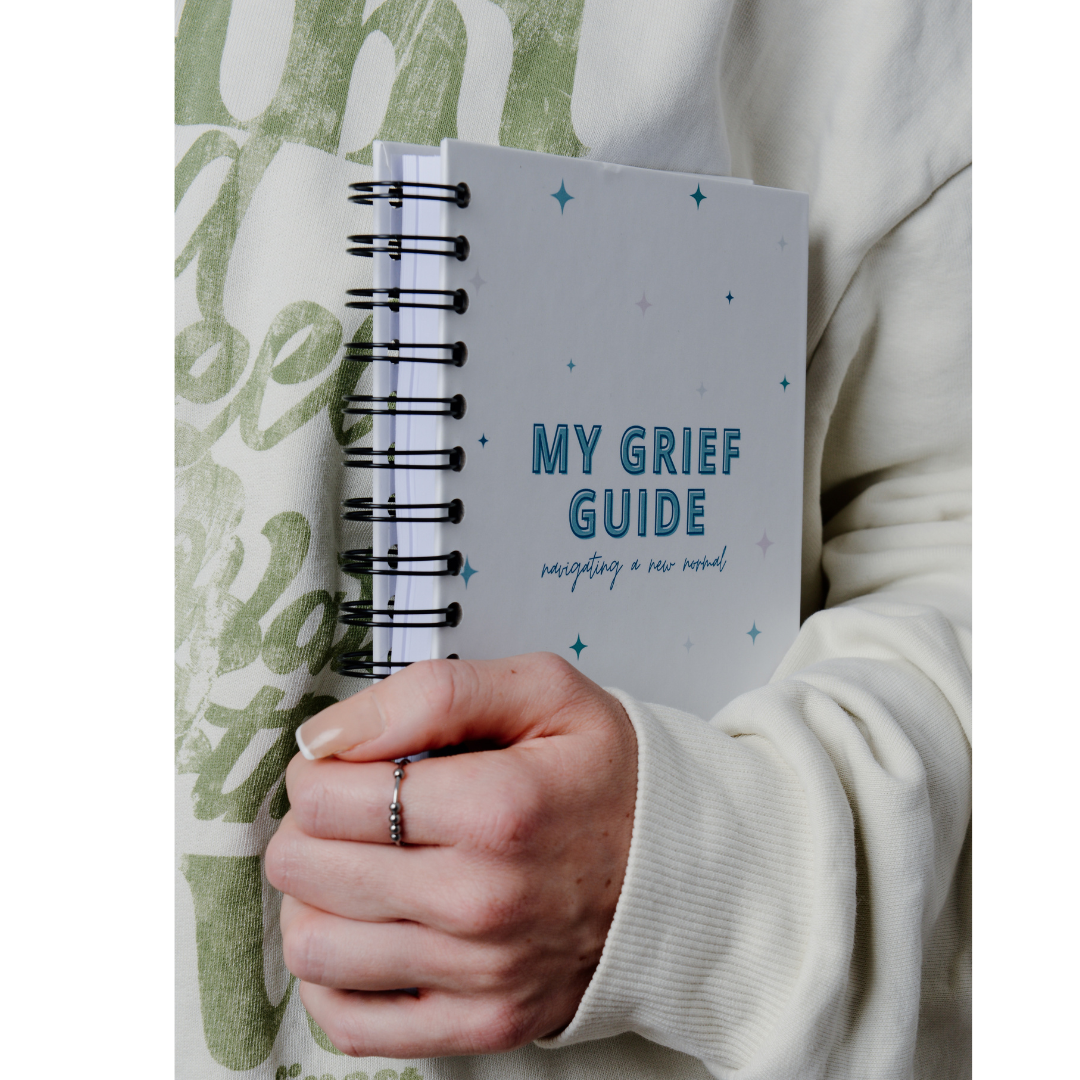
Did you know...
Brain scans on volunteers showed that putting feelings down on paper reduces activity in a part of the brain called the amygdala, which is responsible for controlling the intensity of our emotions.
Psychologists who discovered the "Bridget Jones effect" said it worked whether people elaborated on their feelings in a diary, penned lines of poetry, or even jotted down song lyrics to express their negative emotions.
-The Guardian

Grief Guide
A 6-Month Guide through Grief & Loss
- Understanding Grief: Navigate its intricate path with empathy and insights.
- Managing Emotions: Find strength amidst overwhelming feelings with practical tips.
- Tailored Coping Strategies: Tools to address your unique needs.
- Trigger Tracker: Take control of triggers, intensifying your grief.
- Daily Reflections: Over 180 pages to guide your healing journey.
"Never trust your fears, for they don't know your strengths"
Athena Singh

6 Months Of Daily Reflections
TAKE ME TO THE GRIEF GUIDEJ K Rowling
Rock bottom became the solid foundation on which I rebuilt my life

REVIEW
Can I just shout from the roof tops how amaizng this bundle is! 41627 things going on in my head and this bundle is so easy to get everything out onto and it's not overwhelming, the most amazing business with the most amazing products and support.
- Tiktok Review
Friendly reminder, if it costs you your mental health, it's too expensive!
Athena Singh
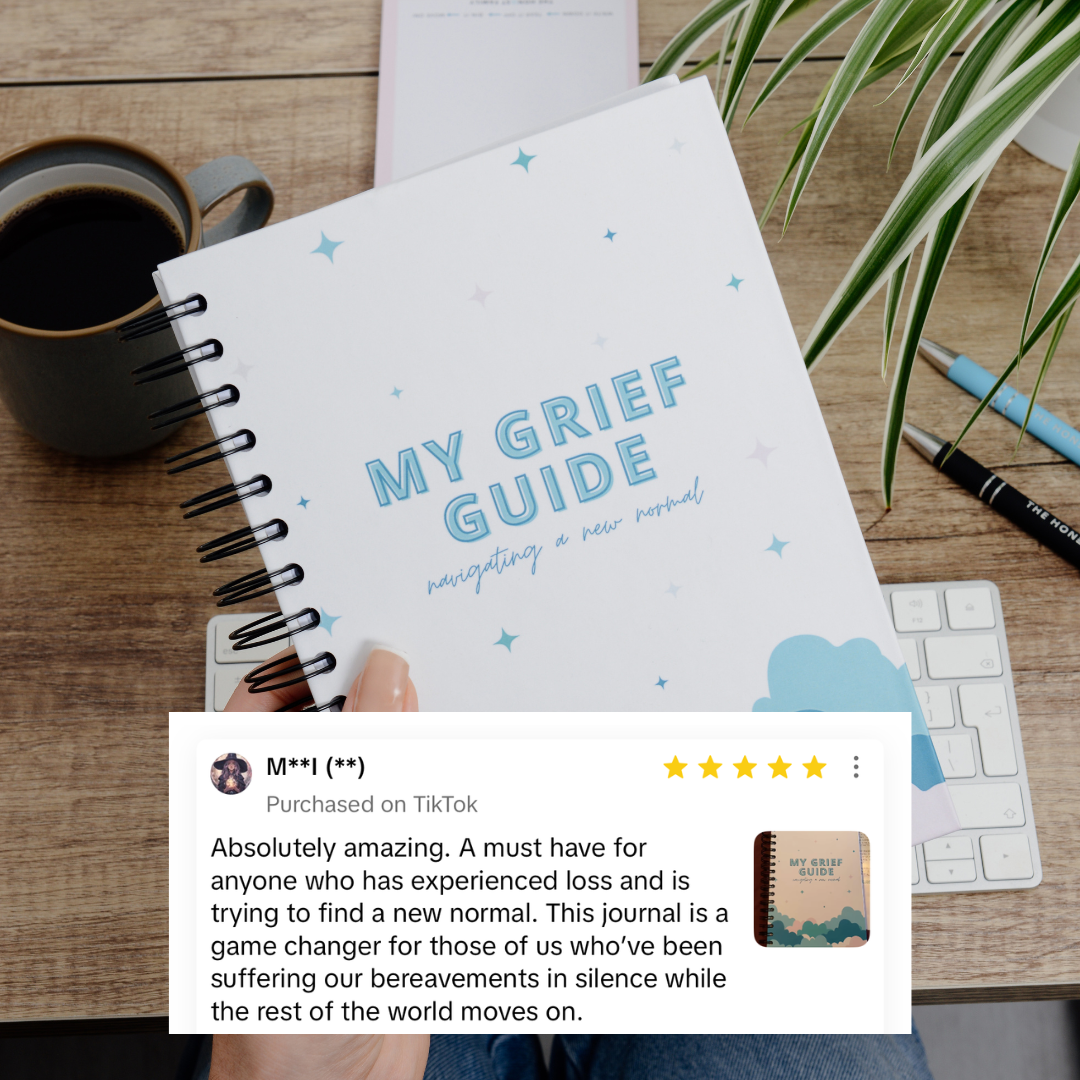
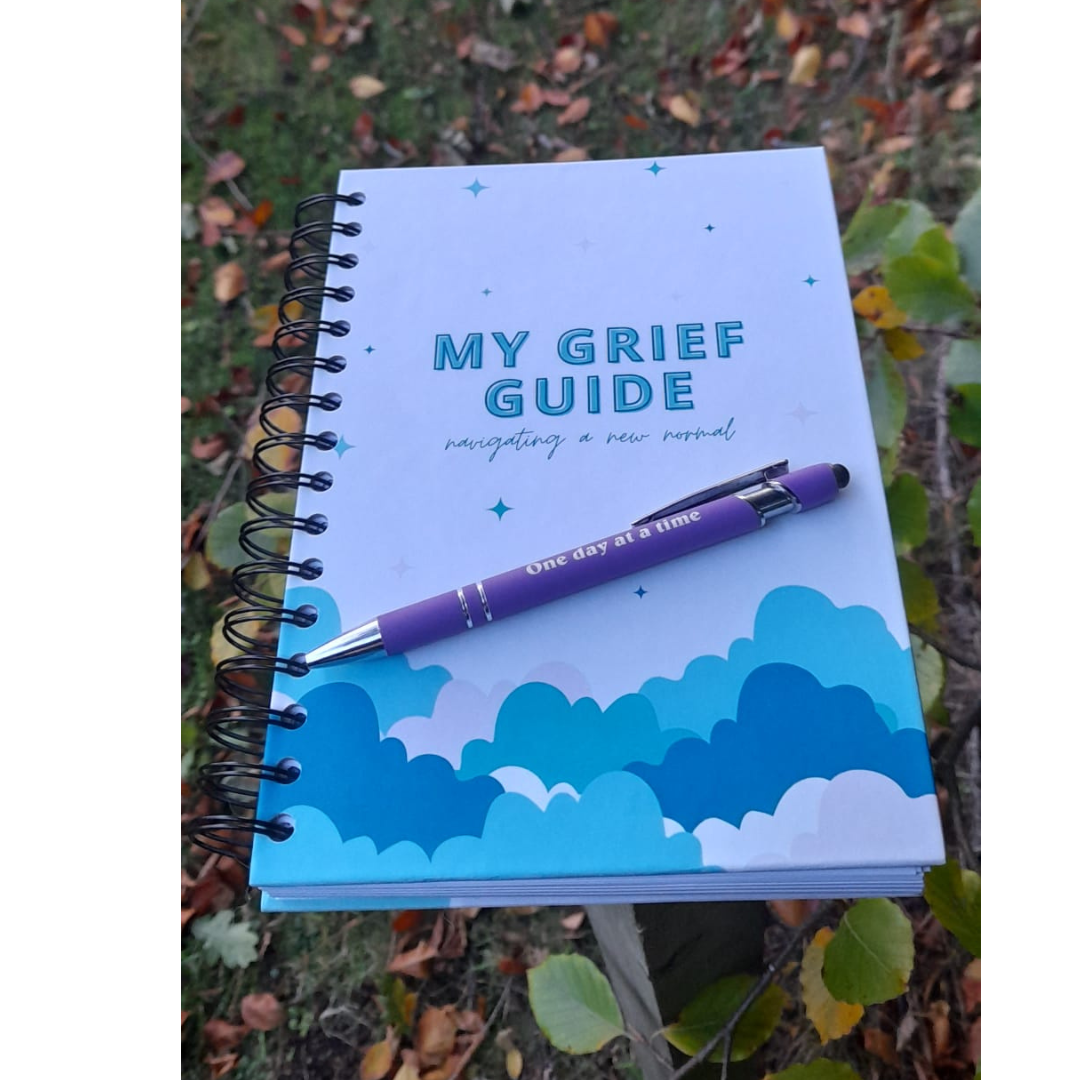
"Giving five stars isn't enough for the Grief Guide"
-Reagan
Example product title
Share
Questions about grief
Can grief and loss really lead to depression?
Yes, absolutely. Grief and loss are powerful emotional experiences that, while natural responses to significant life changes, can sometimes evolve into clinical depression. The key lies in the intensity and duration of the emotional impact.
While grief is a normal and necessary process that allows individuals to cope with loss, depression represents a more prolonged and severe manifestation of these emotions.
Grieving involves a series of stages, as identified by Elisabeth Kübler-Ross, including denial, anger, bargaining, depression, and acceptance. It's essential to recognise that these stages are not linear or universal, and individuals may experience them in varying sequences and intensities.
When grief becomes persistent, overwhelming, and disrupts daily functioning for an extended period, it can transform into depression. The boundary between grief and depression can be subtle, as both share common symptoms such as sadness, sleep disturbances, appetite changes, and difficulty concentrating.
It's crucial to pay attention to the duration and intensity of these symptoms. Grief tends to soften and evolve over time, allowing individuals to adapt to the new reality, while depression persists and has a more profound impact on overall well-being.
If you are struggling, you should reach out to a medical practitioner or someone you trust; if you need support, you can call SAMARITANS on 116 123.
How grief and loss can impact a person
Grief and loss have a profound impact on individuals, affecting their emotional, cognitive, and physical well-being.
Emotionally, individuals may experience intense sadness, anger, and guilt. Grief can disrupt cognitive processes, leading to difficulties in concentration and decision-making. Physical symptoms like sleep disturbances and changes in appetite are common. Socially, individuals may find it challenging to engage with others, leading to a sense of isolation. Grief can prompt spiritual reflection and redefine one's identity. In the long term, it may contribute to mental health disorders such as depression. Seeking professional help, open communication, and allowing time for grief are crucial for navigating this complex experience.
Can you experience grief for a pet?
Losing a pet can be really tough. Pets are like family, and when they're gone, it's totally normal to feel a deep sense of grief. You might miss their cuddles, playful moments, and the joy they brought into your life.
It's okay to feel sad, and everyone copes differently. Remembering the good times, creating a little memorial, or talking to friends who understand can help. Losing a pet is like losing a friend, and it's okay to take the time you need to grieve and remember the special moments you shared.
How to deal with grief and loss
Dealing with grief and loss is tough, but there are ways to navigate through it. First off, it's okay to feel all those emotions – sadness, confusion, anger.
One important step is talking to someone about it. Friends, family, or even a professional can offer support and understanding.
If you prefer expressing yourself in writing, the honest family mental health notepads and grief guides can be a great help. Writing things down can be a therapeutic way to process stress and emotions. It's like giving your brain a little space to sort through everything.
So, whether you're having a heart-to-heart chat or jotting down your thoughts, there's no right or wrong way to deal with grief. Just take it one step at a time, and remember, support is out there when you need it.
Are grieving & mourning the same thing
Grieving and mourning, while often used interchangeably, have some subtle differences. Grieving is the internal, personal experience of loss – all those emotions and feelings we go through. It's like your own private journey through sadness, memories, and healing.
On the other hand, mourning is more outward. It's how we express that grief to the world – the ceremonies, rituals, or even just talking about the person or pet we've lost. It's sharing our grief with others.
So, in a nutshell, grieving is what's happening on the inside, and mourning is how we show it on the outside. Both are totally okay and part of the process when dealing with loss. It's all about finding what feels right for you during this time.
Are grief support groups helpful?
Grief support groups can be incredibly helpful for many people going through the challenging experience of loss. These groups provide a supportive and understanding environment where individuals can share their feelings, stories, and coping strategies with others who are facing similar challenges.
Here's why grief support groups can be beneficial:
1. Shared Understanding In a grief support group, you're surrounded by people who understand the depth of your emotions because they are going through similar experiences. This shared understanding can be incredibly comforting.
2. Validation of Feelings: Expressing your emotions and hearing others share theirs helps validate that what you're feeling is normal. Grief can be isolating, and being part of a group reminds you that you're not alone.
3. Different Perspectives: Grief affects everyone differently. In a support group, you get to hear various perspectives and coping mechanisms, providing new insights and potential strategies for dealing with your own grief.
4. Safe Space for Expression: Support groups offer a safe and non-judgmental space to express your thoughts and feelings. Sometimes, sharing your story can be a crucial part of the healing process.
5. Professional Guidance: Some support groups are facilitated by mental health professionals who can provide guidance and facilitate discussions. This ensures that the group remains a constructive and helpful space.
6. Long-Term Support: Grief is a process that doesn't have a fixed timeline. Support groups can offer ongoing support, allowing individuals to navigate the different stages of grief at their own pace.
Remember, the effectiveness of a support group can vary from person to person. Some may find immense comfort and support, while others may prefer alternative forms of coping. It's all about finding what works best for you during this challenging time.
Can grieving make you tired
Grieving can indeed make you feel exhausted. The emotional toll of loss, coupled with the stress and sadness that often accompany grief, can lead to physical fatigue. The mental and emotional strain of processing intense emotions and navigating through the complexities of grief can drain your energy levels.
In addition to the emotional aspect, disrupted sleep patterns and changes in appetite, which are common during grief, can also contribute to feelings of tiredness. Grieving is a holistic experience that impacts not only your emotions but also your physical and mental well-being.
It's important to recognise and allow yourself the rest you need during this challenging time. If fatigue persists or becomes overwhelming, it may be helpful to consult with a healthcare professional for additional support and guidance.
Can grieving cause memory issues
Yes, grieving can affect memory. The emotional stress and psychological impact of grief may lead to difficulties with concentration and recall. Factors such as emotional distress, disrupted sleep, and overwhelming emotions can contribute to temporary memory challenges during the grieving process. If these issues persist, seeking support from a healthcare professional is advisable.
How grieving changes the brain
Grieving can bring about changes in the brain's functioning and structure. The emotional and psychological impact of loss can influence various areas of the brain, leading to both short-term and long-term alterations. Here are some ways grieving can affect the brain:
1. Stress Response: Grieving activates the body's stress response, releasing hormones like cortisol. Prolonged exposure to high levels of stress hormones can impact the hippocampus, a region crucial for memory and emotional regulation.
2. Neurotransmitter Changes: Grief can alter the balance of neurotransmitters, such as serotonin and dopamine, affecting mood and contributing to symptoms of sadness and depression.
3. Hypervigilance: The brain may become more alert and hypervigilant during grief, constantly scanning the environment for potential threats or triggers related to the loss.
4. Memory Formation and Recall: Grieving can impact memory processes, making it challenging to concentrate, remember details, and organize thoughts. This is partly due to the influence of stress hormones on the brain's memory-related structures.
5. Changes in Neural Pathways: Long-term grieving may lead to structural changes in the brain, affecting neural pathways associated with emotions, decision-making, and coping mechanisms.
6. Adaptation: The brain undergoes a process of adaptation during grief, as it tries to make sense of the new reality without the person or thing that was lost.
It's important to note that the brain is a remarkably resilient organ, and many of these changes are part of a natural coping process. While grief can bring about alterations in the brain, the majority of these changes are reversible, especially with time, support, and healthy coping mechanisms. Seeking professional help if needed is crucial for those experiencing prolonged or severe emotional distress during the grieving process.
What does grief feel like
Grieving is a deeply personal and complex experience, and it can feel different for each individual. Here are some common emotions and sensations associated with grief:
1. Sadness: Profound feelings of sadness and sorrow are often at the core of grief. This can manifest as a heavy heart, a deep ache, or a persistent sense of longing.
2. Numbness: Some people experience a sense of emotional numbness, as if they are detached from their usual feelings. This can be a coping mechanism to protect oneself from overwhelming emotions.
3. Shock and Disbelief: Especially in the early stages of grief, there may be a sense of shock or disbelief, making it difficult to comprehend the reality of the loss.
4. Anger: Grief can evoke feelings of anger or frustration, whether directed at oneself, others, or even the situation. This anger is a natural part of the emotional process.
5. Guilt: Many people feel guilty or question if they could have done more, said more, or been there for their loved ones. Guilt is a common emotion in the grieving process.
6. Physical Sensations: Grief is not just an emotional experience; it can also manifest physically. Individuals may experience fatigue, changes in appetite, sleep disturbances, and even aches and pains.
7. Confusion: Grief can bring about a sense of confusion, making it challenging to concentrate, remember details, or make decisions. This is often referred to as "grief brain."
8. Waves of Emotion: Grieving is not a linear process. Emotions may come in waves, with moments of intense sadness followed by periods of relative calm. These waves can be unpredictable.
9. Yearning: A deep yearning for the presence of the person or thing that was lost is a common aspect of grief. This can manifest as a desire to see, hear, or be with the person again.
10. Loneliness: Grief can be an isolating experience. Even in the presence of others, there may be a profound sense of loneliness as the individual grapples with their unique emotions.
It's important to emphasize that there is no "right" way to grieve, and everyone's experience is valid. Grieving is a process that unfolds over time, and seeking support from friends, family, or professionals can be essential in navigating its challenges.
Do you know of any bible verses that may bring comfort in grief
Certainly, many people find comfort in turning to the Bible during times of grief. Here are a few verses that offer solace and encouragement:
- Psalm 34:18 (NIV):"The Lord is close to the brokenhearted and saves those who are crushed in spirit."
- Matthew 5:4 (NIV):"Blessed are those who mourn, for they will be comforted."
- Psalm 147:3 (NIV):"He heals the brokenhearted and binds up their wounds."
- Isaiah 41:10 (NIV):"So do not fear, for I am with you; do not be dismayed, for I am your God. I will strengthen you and help you; I will uphold you with my righteous right hand."
- John 14:27 (NIV):"Peace I leave with you; my peace I give you. I do not give to you as the world gives. Do not let your hearts be troubled and do not be afraid."
Quotes about grief
Indeed, here are some non-religious quotes that offer insights and comfort about grieving:
1. "Grief is like the ocean; it comes on waves ebbing and flowing. Sometimes the water is calm, and sometimes it is overwhelming. All we can do is learn to swim." - Vicki Harrison
2. "Grief, no matter where it comes from, can only be resolved by connecting to other people." - Thomas Horn
3. "Grieving doesn't make you imperfect. It makes you human." - Sarah Dessen
4. "Grief is the price we pay for love." - Queen Elizabeth II
5. "Grief is never something you get over. You don't wake up one morning and say, 'I've conquered that; now I'm moving on.' It's something that walks beside you every day." - Gwen Flowers
6. "The reality is that you will grieve forever. You will not 'get over' the loss of a loved one; you will learn to live with it. You will heal, and you will rebuild yourself around the loss you have suffered." - Elizabeth Kubler-Ross
7. "Grieving is a journey that teaches us how to love in a new way now that our loved one is no longer with us. Consciously remembering those who have died is the key that opens the hearts, that allows us to love them in new ways." - Tom Attig
8. "The pain of grief is just as much part of life as the joy of love; it is perhaps the price we pay for love, the cost of commitment." - Colin Murray Parkes
These quotes reflect the universal aspects of grief, acknowledging the pain and complexity of the process while highlighting the importance of connection and the enduring nature of love.
Will grieving ever end?
The experience of grief is unique to each individual, and there is no universal timeline for its resolution. Grief doesn't have a set endpoint, and it cannot be neatly tied up or concluded. Instead, it tends to evolve and change over time.
For many people, the intense and acute pain of grief lessens as time passes. They learn to adapt to the new reality of life without the person or thing they lost. However, the impact of grief may still be felt, and certain events, anniversaries, or memories can trigger waves of emotion even years after the loss.
Grieving is a process of adjustment, not something to be "completed" or "overcome." It becomes a part of the individual's life story, influencing how they perceive the world and interact with others. People find ways to live with their grief, incorporating the memories of their loved ones into their lives.
It's essential to approach grief with patience and self-compassion. Seeking support from friends, family, or professionals can be beneficial during this journey. Everyone's experience with grief is unique, and there is no right or wrong way to grieve. If feelings of grief persist and significantly impact daily life, seeking guidance from a mental health professional may be helpful.


